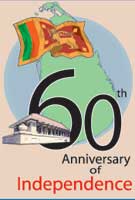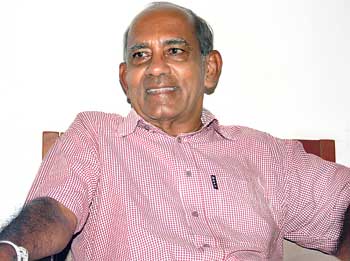
From nice days to the not so nice
During 60 years of Independence, Sri Lanka’s Parliamentary system has witnessed some monumental events, some of which are probably unique to this country. The country has been ruled under three Constitutions, seen a bomb attack on its premises and even come close to impeaching a President. One man who has been in the thick of many of the happenings is former Secretary General of Parliament Nihal Seneviratne who spent 34 years working within Sri Lanka’s Parliamentary system and looks back today at some of the events with nostalgia. “Those were the days when the niceties of Parliamentary procedure were observed to the hilt and the decorum, dignity and respect of parliamentary privilege upheld.” Such remarks may sound alien to many of the younger generation who have sadly grown accustomed more to the unsavoury side of Parliament but for Mr. Seneviratne, who began his career in Parliament in 1960, they are descriptive of the days gone by. Though his advent into Parliament in 1960 as the Second Clerk Assistant to the House of Representatives was more than a decade after the country gained Independence from British rule, the law makers of the day were still flushed with enthusiasm, a sense of dedication and energy that the men and women at the helm of a country learning the ropes of running its own affairs would naturally have and that was the world of parliamentary politics that Nihal Seneviratne was thrust into. Legendary Sri Lankan politicians such as Dudley Senanayake, N.M. Perera, Colvin R. de Silva, Sirimavo Bandaranaike, Pieter Keuneman, G.G. Ponnambalam and S.J.V. Chelvanayagam trod the political landscape aware that a great responsibility lay in their hands to build on the foundation of a young nation to enable future generations to take over the reins of power and take the country forward. “They (MPs) took their work as parliamentarians very seriously then. They studied the subjects they had to debate, they spent time in the library in the Legislature and always kept debates at a decent level,” Mr. Seneviratne recalled. So it is little wonder that the members of the public would be lining up to his office to get a ticket to enter the public gallery to listen to some of the speakers. During his tenure in office, Mr. Seneviratne had been in the thick of some of the most monumental happenings in the country’s parliamentary history which began with the country’s first general elections in 1947. The shifting of Parliament from the old Parliament building at Galle Face to the present location at Sri Jayewardenepura Kotte in April 1982 was a historic occasion. Mr. Seneviratne who had by then been appointed as the Secretary General of Parliament visited the marshy land at Kotte along with the then Speaker Anandatissa de Alwis to look at the location where the new Legislature was to be built.
The capacity of the old building to accommodate the growing number of legislators had reached saturation point and the need for a new building was felt after President J.R.Jayewardene came to power in 1977, Mr. Seneviratne said. The number of elected representatives had increased steadily since 1947 going from 101 in the first House of Representatives in 1947 to 157, and then to 168 members in the National State Assembly and to 225 in the 1978 Parliament. While the work on the building was completed by a Japanese company, the enormous task of ensuring that all documents, records, photographs etc that were in the old Parliament were moved safely to the new building fell largely on the Secretary General’s shoulders and he had to enlist the assistance of the military in the task. The opening of the new Parliament itself was an eventful one with the then President Jayewardene himself presiding over the event and party leaders joining in the exercise, even though some had reservations about how much it had cost to build the new complex while cynics felt the move was more because of President Jayewardene wanting to perpetuate his name in the name of the new administrative capital of the country Sri Jayewardenepura. The enactment of a new Republican Constitution for the country by the United Front Government in 1972 was another monumental event. The new Constitution was drafted by Members of Parliament themselves functioning as a Constituent Assembly under then Speaker Stanley Tilekeratne. During the time, the House met in the mornings at the old Parliament in Galle Face and shifted in the afternoons to the Royal College auditorium Navarangahala. The exercise continued for six months and Mr. Seneviratne as Second Clerk Assistant at that time witnessed the enactment of Sri Lanka’s Republican Constitution on May 22, 1972. Mr. Seneviratne has seen three Constitutions at work in the country from the Soulbury Constitution to the Republican Constitution to the present 1978 Constitution and feels that some of the positive features in the Soulbury Constitution which ensured rights to minorities as well as assured the independence of the Public Service should have served the country well had they not been discarded when enacting the new Constitution in 1972. Tensions between Sinhalese and Tamil legislators which come to the fore in many parliamentary debates in the present day were simmering even then, according to him but the real split came in 1983 with the enactment of the Sixth Amendment to the Constitution which made it mandatory for all MPs to take an oath which made encouraging or advocacy of the establishment of a separate state in Sri Lanka illegal. The passage of the law resulted in the TULF--which at the time was the main opposition party-- resigning from Parliament. “I had some TULF MPs come to my office at the time and tell me, ‘There are a group of youth in the north who feel we are not strong enough in advocating the cause of the Tamils.’ Now I know they were talking of the LTTE and other Tamil youth who took up arms,” Mr. Seneviratne said. August 19, 1987 is a day that the former Secretary General says is embedded clearly in his mind. It was a day that could have changed the history of the country had the man who lobbed a grenade into the Committee Room in Parliament in which President Jayewardene, then Prime Minister Ranasinghe Premadasa as well as top ministers were gathered for a meeting, succeeded in his mission. “I was in my room when a worker came and said, ‘Sir come. There is a bomb’.” Mr. Seneviratne had run down the steps from his office on the second floor of the Parliament building to the main Committee Room on the ground floor to see a seriously wounded Minister being taken away on a stretcher and Prime Minister Premadasa with a shrapnel wound on his leg telling Mr. Seneviratne, ‘Have the place surrounded, Parliament is under attack.’ In the confusion that reigned soon after, it was not clear if there was only one attacker or there was a major attack on Parliament and hence the panic. “I was later told had the attacker thrown the grenade a minute after he had pulled the plug, it would have exploded right in front of the table where the President and the Prime Minister were seated. It is hard to conceive what would have happened had the attacker succeeded that day,” he said. October 1991 was another unforgettable event when a group of UNP-breakaway MPs along with the support of the Opposition attempted to bring an impeachment motion against the then President Premadasa. Although the move eventually failed, Mr. Seneviratne despite being the Secretary General at the time was kept in the dark about it until the matter became public. “It was one of the best guarded secrets in Parliament because until President Premadasa was sent a copy of the motion he was unaware of the moves against him,” he recalled. To this day the matter remains shrouded in mystery and as to who signed and who did not sign it is still being debated. So, “Quo Vadis Sri Lanka’s Parliamentary democracy” is the query that many have. Is there an alternative to the present system as Sri Lanka looks beyond its 60th year of Independence? “I believe in the parliamentary system. Jaw-jaw is better than war-war,” is Mr. Seneviratne’s view. The majority of Sri Lankans too believe that jaw-jaw is better than war-war but it is up to the present-day law-makers to heed the example of some of their predecessors and take their duties as elected representatives of the people more seriously if the faith that the electors have placed in them, at election after election, is to continue way beyond the 60th year of self-rule. |
|
||||||
|| Front
Page | News | Editorial | Columns | Sports | Plus | Financial
Times | International | Mirror | TV
Times | Funday
Times || |
| |
Reproduction of articles permitted when used without any alterations to contents and the source. |
© Copyright
2008 | Wijeya
Newspapers Ltd.Colombo. Sri Lanka. All Rights Reserved. |

